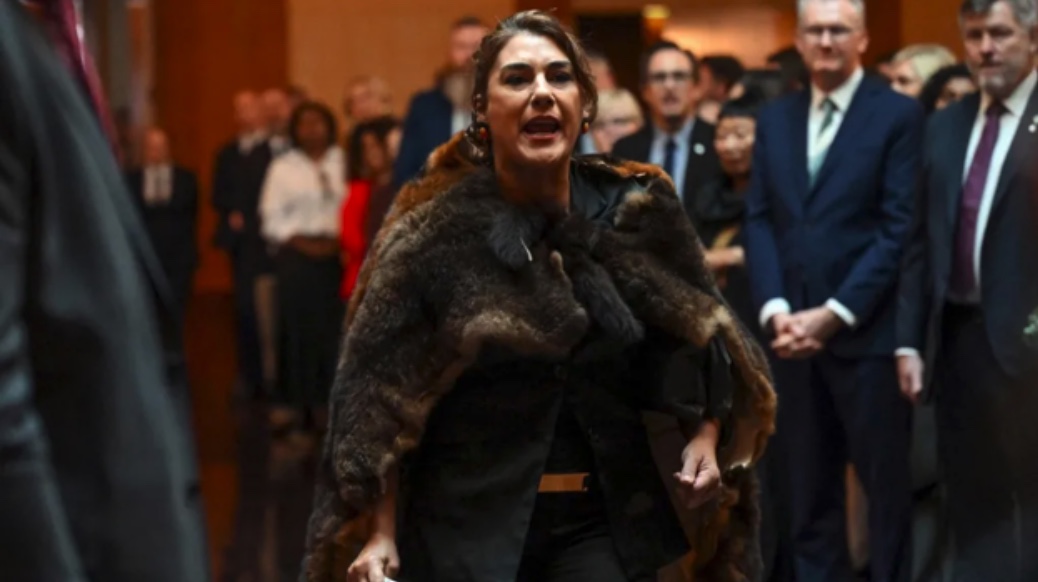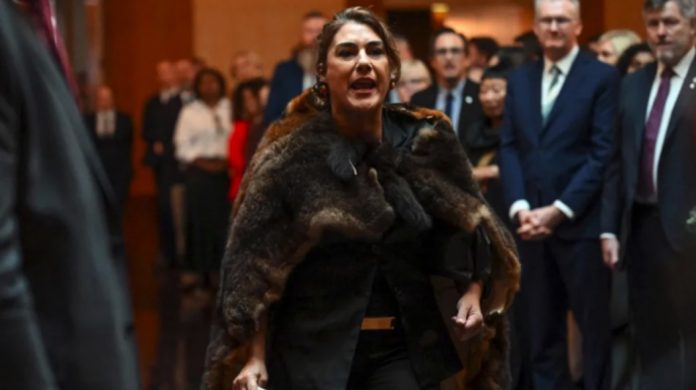รัฐสภาออสเตรเลียลงมติประณาม ลิเดีย ธอร์ป วุฒิสมาชิกเชื้อสายอะบอริจิน หลังเธอตะโกนว่า “คุณไม่ใช่กษัตริย์ของฉัน” และ “นี่ไม่ใช่ดินแดนของคุณ” ระหว่างที่กษัตริย์ชาร์ลส์ทรงเยือนกรุงแคนเบอร์ราเมื่อเดือนที่แล้ว เหตุการณ์นี้เกิดขึ้นหลังจากพระองค์ทรงกล่าวต่อที่ประชุมใหญ่ของรัฐสภา โดยธอร์ปตั้งใจประท้วงเพื่อเน้นย้ำถึงผลกระทบจากการล่าอาณานิคมของอังกฤษ
วุฒิสภาลงมติ 46 ต่อ 12 เสียง เห็นชอบกับการตำหนิการกระทำของธอร์ป โดยระบุว่าเป็นพฤติกรรม “ไม่เคารพและก่อกวน” ซึ่งไม่สมควรแก่การเป็นตัวแทนของวุฒิสภาในคณะผู้แทนใด ๆ การตำหนินี้เป็นเพียงสัญลักษณ์ทางการเมืองและไม่มีผลทางกฎหมายหรือรัฐธรรมนูญ
หลังการลงมติ ธอร์ปให้สัมภาษณ์กับผู้สื่อข่าวว่าเธอถูกปฏิเสธสิทธิ์ในการตอบโต้ในที่ประชุม เนื่องจากเที่ยวบินล่าช้า พร้อมยืนยันว่า “ราชวงศ์อังกฤษได้ก่ออาชญากรรมร้ายแรงต่อชนพื้นเมืองดั้งเดิมของประเทศนี้…ฉันจะไม่ยอมอยู่อย่างไร้ปากเสียง”
การประท้วงครั้งนี้ถูกวิพากษ์วิจารณ์อย่างรุนแรงจากทั้งสองฝ่ายของการเมือง รวมถึงผู้นำชุมชนอะบอริจินและชาวเกาะช่องแคบทอร์เรส แต่ขณะเดียวกันก็ได้รับการสนับสนุนจากกลุ่มนักเคลื่อนไหวบางส่วน ที่มองว่าเป็นการชี้ให้เห็นถึงความทุกข์ยากของชนพื้นเมือง ซึ่งยังคงเผชิญกับความเสียเปรียบในด้านสุขภาพ ความมั่งคั่ง การศึกษา และอายุขัยเมื่อเทียบกับชาวออสเตรเลียทั่วไป
แม้จะมีเหตุการณ์ดังกล่าว กษัตริย์ชาร์ลส์ยังคงได้รับการต้อนรับอย่างอบอุ่นจากชาวออสเตรเลียในระหว่างการเสด็จฯ 5 วัน พร้อมด้วยสมเด็จพระราชินีคามิลลา นายกรัฐมนตรีแอนโทนี อัลบานีซี กล่าวชื่นชมพระองค์ในสุนทรพจน์อย่างเป็นทางการว่า “พระองค์ทรงแสดงความเคารพอย่างยิ่งต่อชาวออสเตรเลีย แม้ในช่วงที่เราถกเถียงกันถึงอนาคตของการปกครองตามรัฐธรรมนูญ และความสัมพันธ์ของเรากับสถาบันกษัตริย์”
ธอร์ปซึ่งมีประวัติการเคลื่อนไหวเพื่อสิทธิชนพื้นเมือง เคยสร้างกระแสข่าวระดับโลกมาแล้วหลายครั้ง ในปี 2022 เธอเคยเรียกสมเด็จพระราชินีนาถเอลิซาเบธที่ 2 ว่าเป็น “ผู้ล่าอาณานิคม” ระหว่างพิธีปฏิญาณตน ซึ่งส่งผลให้ต้องกล่าวคำสาบานใหม่
เมื่อปีที่ผ่านมา ชาวออสเตรเลียลงประชามติปฏิเสธข้อเสนอที่จะให้ชนพื้นเมืองได้รับการรับรองในรัฐธรรมนูญ และจัดตั้งองค์กรที่ให้คำแนะนำแก่รัฐสภาในประเด็นที่เกี่ยวข้องกับพวกเขา แม้ข้อมูลจะแสดงให้เห็นว่าคนส่วนใหญ่ในชุมชนอะบอริจินสนับสนุนแนวทางนี้ แต่ลิเดีย ธอร์ปซึ่งเป็นแกนนำคัดค้าน ได้วิจารณ์ว่าแนวคิดดังกล่าวเป็นเพียง “สัญลักษณ์ที่ว่างเปล่า”
Australian senator censured for heckling King

Australian lawmakers have voted to censure an Aboriginal senator who heckled King Charles during his visit to Canberra last month, to express their “profound disapproval” of her protest.
Lidia Thorpe shouted “you are not my King” and “this is not your land” shortly after the King addressed the Great Hall of Parliament, in an effort to highlight the impacts of British colonisation.
The Senate’s censure, which passed 46-12, described Thorpe’s actions as “disrespectful and disruptive” and said they should disqualify her from representing the chamber as a member of any delegation.
A censure motion is politically symbolic but carries no constitutional or legal weight.
Shortly after the Senate vote on Monday, Thorpe told reporters she had been denied her right to respond in the chamber due to a flight delay.
“The British Crown committed heinous crimes against the first peoples of this country… I will not be silent,” the independent senator said.
Her protest last month drew immediate ire from across the political aisle, as well as from some prominent Aboriginal and Torres Strait Islander leaders.
But it also drew praise from some activists who argued that it highlighted the plight of Australia’s first inhabitants, who endured colonial violence and still face acute disadvantages in terms of health, wealth, education, and life expectancy compared to non-Indigenous Australians.
Despite the protest, the King was warmly greeted by Australian crowds during his five-day tour alongside Queen Camilla.
“You have shown great respect for Australians, even during times when we have debated the future of our own constitutional arrangements and the nature of our relationship with the crown. Nothing stands still,” Prime Minister Anthony Albanese said in an official address.
Thorpe has a history of Indigenous activism which has, at times, grabbed global headlines.
During her swearing in ceremony in 2022, the Gunnai, Gunditjmara and Djab Wurrung woman referred to the Queen Elizabeth II as a coloniser – and was asked to retake her oath after facing criticism.
Last year, Australia decisively rejected a proposal to grant Aboriginal and Torres Strait Islander people constitutional recognition and allow them to establish a body to advise parliament on issues impacting their communities.
The referendum – known as the Voice – became ensnared in a bruising campaign, and both sides of politics have sought to move on swiftly, leaving uncertainty over future policy.
While the data suggests a majority of Aboriginal and Torres Strait Islander people voted ‘Yes’, support wasn’t unanimous. Thorpe herself was a leading ‘No’ campaigner, having criticised the measure as tokenistic.
By Hannah Ritchie, BBC News

















